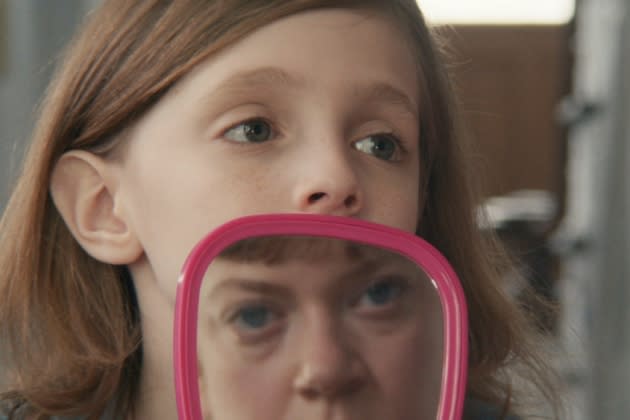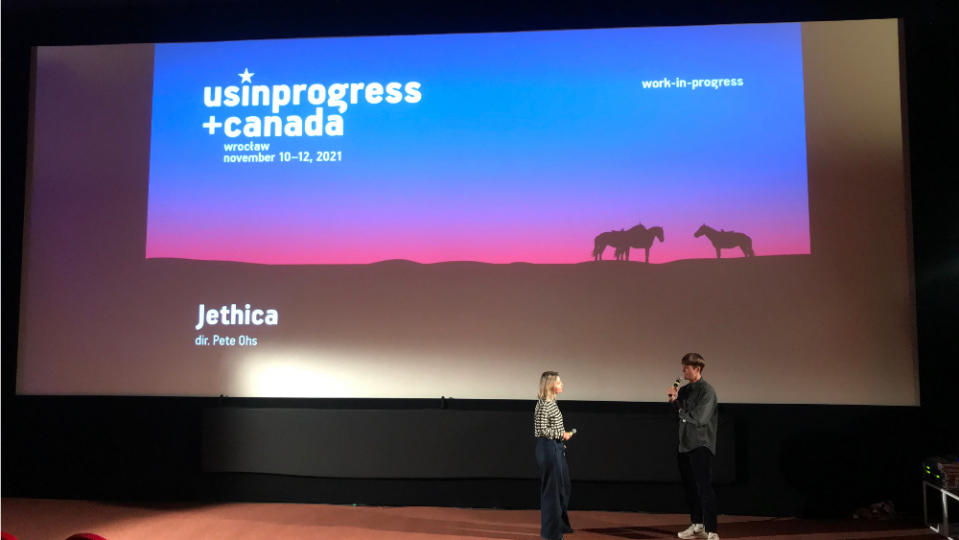A ‘Sense of Hope’ Fuels American Indie Filmmakers Trying to Crack the European Market
- Oops!Something went wrong.Please try again later.

The first time he made the trip to Europe to take part in U.S. in Progress, an event dedicated to independent American filmmaking launched by Poland’s American Film Festival in 2011, L.A.-based director Pete Ohs admits he was “very green.” “It was my first narrative feature…[and I was] very much getting into this world of independent filmmaking,” Ohs tells Variety.
U.S. in Progress, which this year takes place Nov. 9 – 11 in Wrocław, Poland, presents a selection of roughly half a dozen American indie titles in the final stages of production to European sales agents, distributors and festival programmers.
More from Variety
A24 Strikes Multi-Picture Deal With Canada's Sphere Films (EXCLUSIVE)
Poland's U.S. in Progress Event Looks to Open Doors in Europe for Independent American Filmmakers
The event is often a crash course in the European market for directors like Ohs, who participated in 2016 with “Everything Beautiful Is Far Away.” For many it’s the first time that they’re exposed to film industry professionals on the continent, offering insight into an ecosystem of financing, production and distribution that’s a world apart from how independent movies are made and sold in the U.S.
Perhaps more importantly, says Ohs, they have the chance to sit down with the sorts of industry players and decision-makers they’d rarely encounter at American indie showcases like South by Southwest, Sundance or Tribeca, where most filmmakers are at a remove from industry gatekeepers.
“At those festivals, the conversations you have can be inspiring, but you’re interacting with other dreamers…[who are] trying to get their movie made,” says Ohs. “The conversations at U.S. in Progress, you’re having conversations with people who are actually the business end of it. Their head is not in the clouds. Their head is in a spreadsheet.” He laughs. “It’s an invaluable thing you don’t get with those [American] festival interactions where you’re not sitting down at a table and talking about…what to do once your movie’s done.”

Joseph Sackett, whose feature directorial debut, “Homebody,” won best first feature at Toronto’s Inside Out 2SLGBTQ+ Film Festival this year after participating in U.S. in Progress, agrees.
“It definitely gave me a sense of hope that there were a lot of sales agents out there, people who are interested. That there were opportunities [to find distribution],” he says. “It felt like we were being exposed to people that we otherwise wouldn’t meet organically in the American indie scene.”
Even for those who are ostensibly a part of it, the indie filmmaking scene in the U.S. can be hard to define. One need look no further than this year’s Independent Spirit Awards, whose top prize went to Maggie Gyllenhaal for her directorial debut “The Lost Daughter,” to recognize that the term “indie filmmaking” in the U.S. covers a wide and diverse terrain.
For every independent filmmaker like Ohs or Sackett there’s an A-list celeb like Gyllenhaal, whose film stars Olivia Colman, Jessie Buckley and Dakota Johnson and was acquired by Netflix, or an indie studio like A24, which made its name championing scrappy underdogs like Barry Jenkins’ best picture Oscar winner “Moonlight,” but last year floated a sale for upwards of $3 billion.
Then there’s a director like Sean Baker, who broke out with a low-budget film about transgender sex workers shot on an iPhone (“Tangerine”). His latest feature, the Cannes premiere “Red Rocket,” which was picked up by A24, came with a $12 million price tag attached — a rounding error for a studio production, but pie in the sky for a struggling filmmaker in Brooklyn, Austin or L.A.
“When filmmakers outside the U.S. look at it, they forget that there is very much a class system of indie filmmakers in America, and those of us that are below a certain line are getting no help whatsoever,” says Geoff Marslett, a Colorado-based director and producer whose animated feature “Quantum Cowboys” participated in U.S. in Progress. “You’re really having to just make the best film you can and quixotically hope someone’s going to care that you made it.”
Using the Polish event as a springboard, “Quantum Cowboys” won the Audience Choice Award at the Champs Elysees Film Festival and Best Original Music at Annecy, and has continued a healthy festival run in Europe. Marslett has since encouraged Skinner Myers, whose last film “The Sleeping Negro” played at Slamdance, to submit his upcoming feature “Before You Fade Away Into Nothing,” which Marslett produced, to U.S. in Progress.
He credits the Polish event, and the American Film Festival that hosts it, for being an “advocate” on behalf of small U.S. films fighting to get noticed in a crowded market.
“You’re honestly not really competing solely against independent films; you’re competing against…the worlds of A24, and all of these, essentially, studios that have filled up the slots at major festivals, which makes it harder for you to get your film distributed on a streaming service or even seen,” he says. “That’s the challenge now: how, as an independent filmmaker, can you collect some advocates so that your film can stand out a little bit in the market.”

For most American indie filmmakers, however, success is far from guaranteed overseas.
“The biggest difficulty is just finding a place for them on the European market,” says Xavier Henry-Rashid of sales agency Film Republic, who notes that independent filmmakers in Europe are generously backed by state-funded film bodies, as well as European Union initiatives like Creative Europe’s Media Program, which funds E.U. film, television and video game development, production, distribution and promotion.
“[American independent films] are at a competitive disadvantage, seeing as how an equivalent European film will get distribution support and those won’t. They’re automatically at a loss,” he continues. “In distribution in Europe, a lot of distributors are asking for films specifically that have subsidies…and that makes it very difficult when releasing anything non-European. The cinemas don’t get support, the distributors don’t get support.”
The exceptions among U.S. indies, he says, are breakout hits that arrive in Europe fresh off a successful run at premiere American fests. “If it hits the Sundance competition, if it makes an impact in South by Southwest, then maybe it’s marketable for European distributors,” he says. “Otherwise, it’s almost not programmable.”
That doesn’t dim the hopes of filmmakers like Sackett, who was encouraged to meet producers and distributors during U.S. in Progress who wanted to hear more about his future plans. “That was exciting, to feel like there were people who were interested not only in what I had done, but what I was going to do next,” says the director, who hopes to begin shooting his next feature, the queer sci-fi romcom “Cross-Pollination,” in spring 2023.
The experience at U.S. in Progress opened up new pathways for Sackett to finance upcoming films. Though “Homebody” (pictured, top), which will get a limited release by Cinedigm this October in L.A. before heading to streaming service Fandor, was financed almost entirely with U.S. equity, producer Joy Jorgensen’s production house Killjoy is based in Berlin, allowing Sackett to access soft money in Germany and make it easier to find potential European co-production partners.
That possibility “was never really on my radar before,” he says. “That was never part of the discussion in film school, or after, when it came to asking the question how you get a movie made.”

Four years after his first trip to U.S. in Progress, Ohs returned in 2020 with “Jethica,” a supernatural dramedy that Variety’s Jessica Kiang described as a “droll, oddly tender genre-melding indie” after it premiered this year at South by Southwest. The film has since gone on to play festivals across the U.S. and Europe before heading to the Busan Film Festival next month.
Ohs credits the Polish event for boosting the film’s visibility at a crucial stage in its development, saying: “Those little things add up.” After going into U.S. in Progress wet behind the ears in 2016, the director “approached it differently” on his second go-around, where he won an award for color correction from the Polish post-production house Black Photon and signed on with the Brooklyn-based sales agent Visit Films.
“I was older and wiser,” he says. “It is this experience where it helps you grow, as a person and as a filmmaker.”
U.S. in Progress takes place Nov. 9 – 11 in Wrocław, Poland. There is no entry fee to submit. Films can be submitted through the event’s website. The final deadline is Sept. 18.
Best of Variety
'The Sopranos' Gets the Funko Pop Treatment in New Collectibles Release
From 'The Sandman' to 'Blonde': Books Made Into Movies and TV Series That You Should Read
Jennette McCurdy's Provocative Book 'I'm Glad My Mom Died' Is Already a No. 1 Bestseller
Sign up for Variety’s Newsletter. For the latest news, follow us on Facebook, Twitter, and Instagram.

